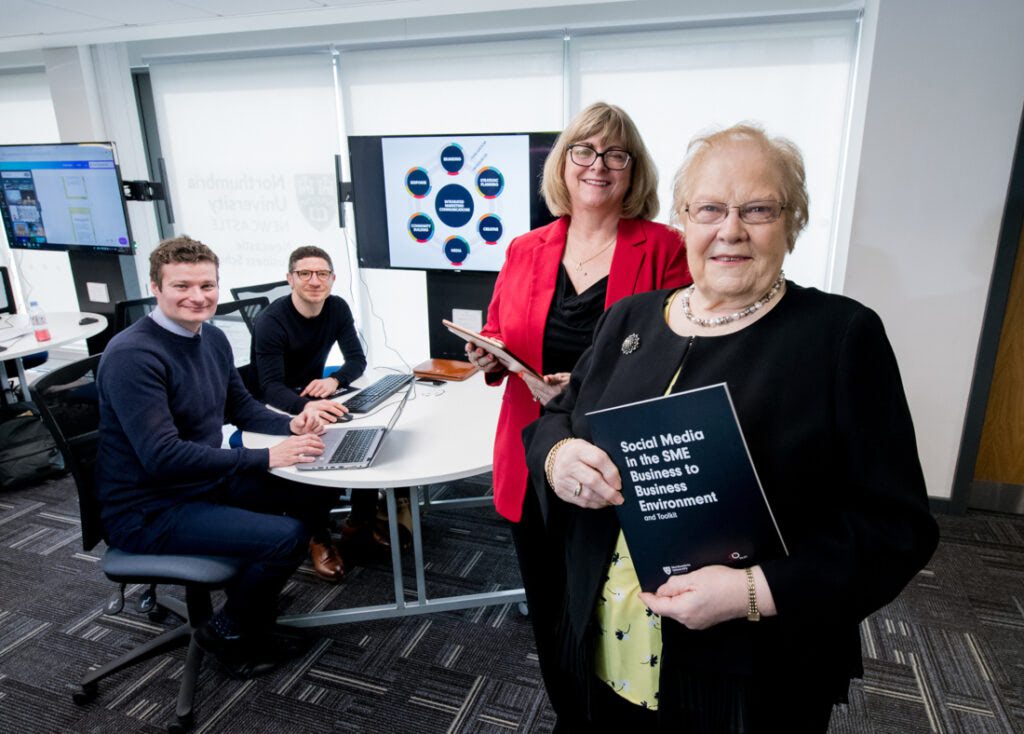Using Social Media Effectively: Seven critical challenges for SMEs

Social media is a powerful marketing tool – but remains a mystery to many businesses.
New research and toolkit unlocks the magic.
Confusion and misunderstanding in the SME business community when it comes to harnessing the power of social media has been highlighted in new research carried out for the Marketing Trust by Northumbria University.
The Marketing Trust and academics from Newcastle Business School collaborated on the project which is designed to support the UK SME business to business (B2B) community to enhance their current marketing practices and approach to social media.
The report, ‘The role of social media in a business to business environment’ identifies seven critical challenges when it comes to effective B2B social media marketing. A supporting toolkit, which utilises the research, aims to help business overcome these challenges.
Key Research Findings from this Study: Seven Critical Challenges
1 Identity
Many SMEs stated that they were unsure whether social media communication should come from the company itself or an individual employee.
Our research identifies that individuals can be powerful brand advocates for your business, providing you give them a platform to contribute to, and enhance, the reputation of the organisation.
2 Presence
Our research discovered that while Twitter, Facebook and LinkedIn are used by most SMEs across a variety of sectors, video- and image-based content are underutilised within the B2B context.
Findings acknowledge that many SMEs need guidance in determining which social media platforms are most relevant to their audience.
3 Relationships
Our research found that social media can be a powerful relationship enabler, providing sufficient structural processes are in place.
Once you have established procedures, it is also critical to ensure that your objectives of social media adhere to your overall marketing strategy.
4 Reputation
Companies can no longer whitewash their reputation across their website. Any form of social media content (created either by yourself or someone else) can impact your brand’s reputation.
Sticking to the brand guidelines and ethos is essential in reducing the risk, and also in helping you to respond to troublesome enquiries effectively.
5 Groups
Our research proves that social media is a powerful tool to build online communities and also co-create content that is likely to be of interest to existing and prospective customers.
The key to driving engagement through social media groups is by creating content that either is of importance to, challenges the beliefs of, or resonates with, your target audience.
6 Conversation
The art of conversation has never been more critical.
Our research highlights the need for content to be considered as authoritative and trustworthy, and that tells stories, appeals to emotion and sparks discourse.
7 Sharing
The only way for businesses to guide the conversation is to be a part of it.
Our research demonstrates that sharing content that creates value for stakeholders can lead to higher levels of engagement when compared to self-promotion.
Mary K Davies, Chairman of the Marketing Trust who commissioned the research, explains:
“We funded this project because we believe the use of social media in a B2B context is widely misunderstood.
“Social media is a fast-changing world of communication and many SMEs are failing to grasp its full potential, instead, opting to dabble in it because they feel they should. In commissioning this study we sought to understand how different types of social media are currently used and the role it can play in enhancing the B2B buyer-seller experience.
“The toolkit underpins the research and is designed to provide practical steps, digital tools and examples of best practice, to help businesses capitalise on the opportunities that social media technology can bring to their marketing campaigns.”
The 12-month study found, for example, that many SMEs were not sure which social media platforms are most relevant to them or how to use social media to drive engagement as part of an integrated B2B marketing communications strategy. Issues around resourcing and responsibility were also cited.
The report is based on face-to-face interviews and focus groups with business owners, a comprehensive literature review and a survey of small and medium sized enterprises carried out by Newcastle Business School researchers.
Project lead, Dr Julie Crumbley, Associate Pro Vice-Chancellor in the Faculty of Business and Law at Northumbria University, said:
“The report responds to the growing appetite for businesses to gain a better understanding of social media marketing and the associated benefits.
“In talking to SMEs and their marketing teams, we’ve been able to help identify and successfully navigate some of the most common challenges surrounding B2B social media marketing and the impact it can have on B2B campaigns.
“The B2B social media toolkit is a practical and easy to follow guide for anyone wanting to improve the effectiveness of their social media activity or a good starting point for any business that has yet to incorporate social media into their wider marketing plan.”
The project has also been warmly welcomed by leading figures in the business community.
Chris Daly, CEO of the Chartered Institute of Marketing, said:
“The research report clearly demonstrates that whilst the growth of technology is creating huge opportunities for reaching consumers and growing businesses, it also brings with it the challenge of keeping pace with regards to skills and resourcing. Through collaborating on this important area of research, the Marketing Trust and Northumbria University have provided a valuable resource that will help our SME community to bridge the digital marketing skills gap.”
James Ramsbotham, North East England Chamber of Commerce CEO, said:
“Advancing technology means the way business communicates with its customers and influencers is constantly evolving. I welcome the Marketing Trust’s commitment to funding valuable research to bridge the knowledge divide and provide practical tools to support the success of the SME community.”
Charlie Nettle, North East Regional Chairman of the Chartered Institute of Marketing, said:
“This is an extremely interesting report which could be very helpful for our region’s B2B SMEs, who I see wrestling with many of these social media questions and challenges today.”
Mary K Davies adds:
“The Marketing Trust has a clear focus on research, education and training. We partnered with Northumbria University because we wanted the academic rigour that a research team like Northumbria would bring to the subject.
“Whilst the report identified that social media is frequently underused and not managed effectively, it offers great potential when used as part of an integrated communications strategy. However, there is one over-riding finding, and that is, the basics of marketing still apply in this dynamic and increasingly important medium.”

















Responses